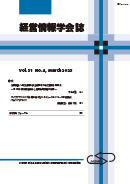
- Issue 4 Pages 151-
- Issue 3 Pages 111-
- Issue 2 Pages 59-
- Issue 1 Pages 1-
- |<
- <
- 1
- >
- >|
-
Takuji SHIMODA2023Volume 31Issue 4 Pages 151-167
Published: March 15, 2023
Released on J-STAGE: March 30, 2023
JOURNAL FREE ACCESSThe purpose of this study is to verify the impact of corporate efforts on climate change on corporate value. As a result of the analysis, it was suggested that environmental activities alone do not increase corporate value because there is information asymmetry between companies and the market. However, it was confirmed that the relationship between environmental activities and TCFD endorsements and between TCFD endorsements and corporate value both became significant and positive by passing through a proxy variable for the presence or absence of TCFD endorsements that recommend information disclosure. Through this research, it was possible to indirectly show the theoretical path between environmental activities and corporate value, which had been difficult to show the relationship. In addition, through propensity score matching analysis, we were able to show that the declaration of support for the TCFD is an activity that is highly evaluated by the market for companies.
View full abstractDownload PDF (606K) -
Takamasa KIKUCHI, Hiroshi TAKAHASHI2023Volume 31Issue 4 Pages 169-188
Published: March 15, 2023
Released on J-STAGE: March 30, 2023
JOURNAL FREE ACCESSPersona methods are widely used in marketing to create customer-centric services. However, the following issues exist in designing and evaluating personas for services and measures that have characteristics which may benefit customers in the distant future, such as in the domains of asset formation and life planning. First, many analyses are based on previous or current customer attributes, which do not always result in accurate customer classification. Second, identifying the appropriate target group is difficult because the impact of the services and measures provided to each persona is not evident. In this paper, we present an example of persona creation and evaluation that considers the above characteristics, targeting the asset formation domain. This method generates future customers attributes using a social simulation based on real data, understands the effects of measures using scenario analysis in a virtual space, and has aspects as a proposal for improving quantitative persona creation methods. The key findings are that predicting and grasping the possibility of future change in customer attributes and creating personas based on these predictions is quantitatively and objectively possible; moreover, quantitatively grasping the impact of services and policies on customers and prioritizing among the created personas is possible.
View full abstractDownload PDF (1910K)
- |<
- <
- 1
- >
- >|